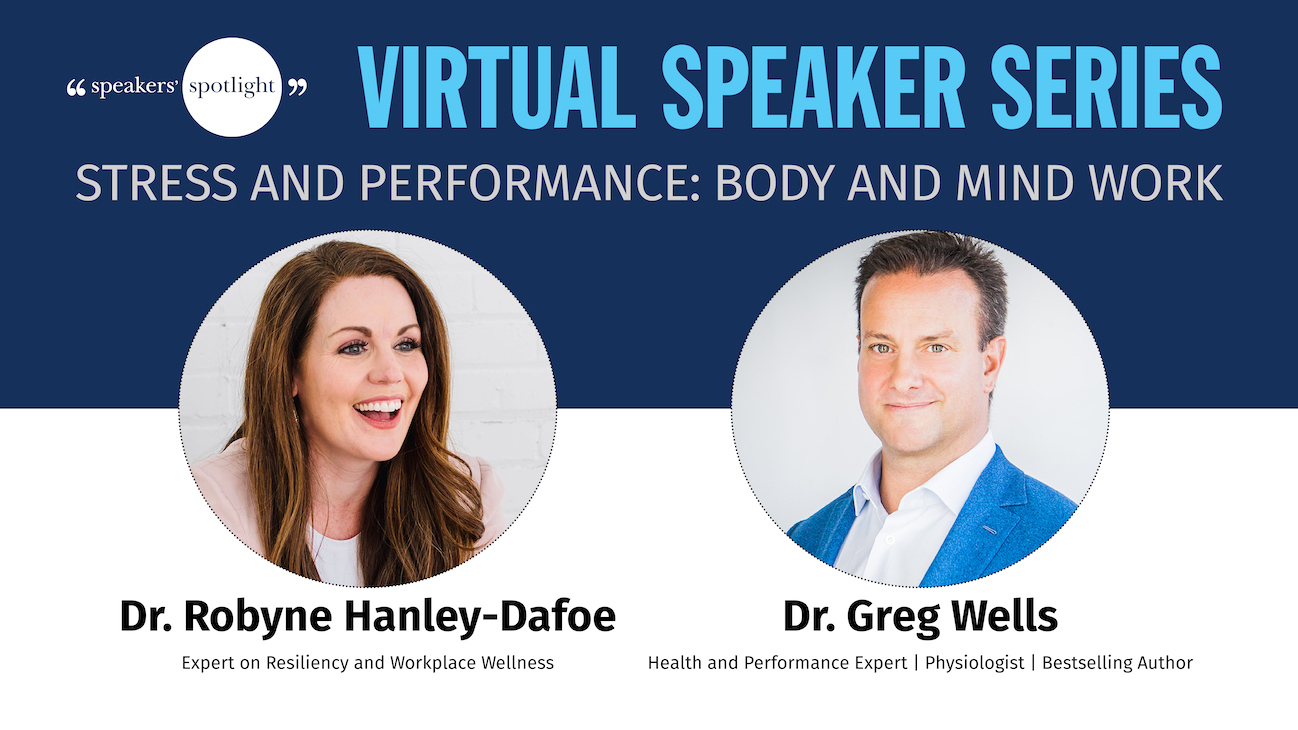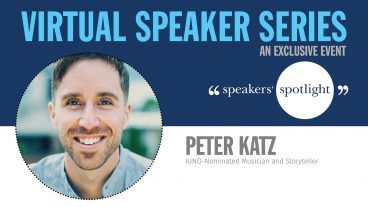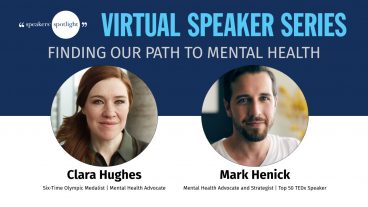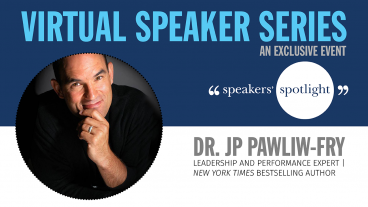Joining us for a special joint Virtual Speakers Series session this week, Dr. Robyne Hanley-Dafoe and Dr. Greg Wells combined their complementary expertise in resilience and performance with their overall knowledge of mental and physical health. Together they offered an overview of some of the biggest challenges facing us as we navigate the second year of the COVID-19 pandemic. This included discussions of understanding and recovering from burnout; managing re-entry into the world of in-person work; and overall advice on building systems of self-care so we can remain healthy and still find ways to thrive.
The two doctors began their presentation by providing a bit of perspective on how they each approach these conversations around the mind and the body. Greg’s work has led him to focus more on neurophysiology, seeking to understand the scientific elements at play between our different shifting states of mind. Working with athletes and top business performers, he has a deep understanding of how our brains shift gears and what we can do to put ourselves in the right state at the right time. He noted up front that it’s understandable people have felt a huge mental strain over the past 12+ months as we’ve gone from our usual daily habits of routine work, errands, and play to a state of perpetual nervousness where we must constantly analyze possible dangers—not to mention frequently changing medical guidelines and criteria as we’ve learned to adapt to the coronavirus.
Robyne, meanwhile, grounds her point of view on physical and mental work in the psychological realm of science. Her work on everyday resiliency has become incredibly timely during the pandemic, and she spoke about seeing significant burnout and “compassion fatigue” among people. Robyne said that the non-stop pace during the pandemic has us eroding our sense of self, making it difficult for us to maintain both motivation for ourselves and empathy for others.
This was the jumping off point for the first area of discussion, revolving around burnout or what has recently been called out as the feeling of “languishing” that many of us are feeling. Both doctors agreed that the demands of continue to work while losing many of our social outlets combined with so much uncertainty has been a powerfully negative mix that we’ve had to contend with. Robyne also noted that because of the levels of privilege that many of us live with – perhaps we’ve continued to work, have not had health issues, are in a comfortable home, etc. – we feel like we’re “not allowed to have a bad day.” She said that this has only compounded the feelings of burnout and fatigue, as we’re not feeling our emotions fully. Not only is this an unhealthy approach, Robyne said, but it also prevents us from giving our full empathy to others. Giving ourselves space to feel is more important than ever.
Greg and Robyne spoke to one of the tools that we should turn to in these times: resilience. They said that everyday resilience is what’s required now, learning to co-exist with our circumstances and how to create a state of mind where we can balance stress and recovery at once. Robyne said it’s not about overcoming the intensity of an isolated event or crisis, but understanding how to be adaptive and flexible. We can have lots of energy and focus some days, and less on others. This is only natural. At the same time, Greg noted that we can work towards finding a middle ground between maintaining our well-being and thriving. By using everyday resilience, we can more easily work towards finding a sync between our personality, purpose, and goals so that everything is in sync.
Robyne and Greg then moved onto the subject of other systems of self-care that we can build for ourselves. They said that in the process of developing these techniques an important starting point is to have clarity about how we want to feel and then target the behaviour that we need to get there. Robyne offered the example of wanting to feel energized after work. To her, the solution is a no brainer: get outside and move. That’s something simple that we know works well to provide that kind of outcome. She said we can find similar actions to feel grounded, refreshed, etc. Greg spoke on his work with high performance athletes and how they would often reverse engineer a feeling to figure out the path to get there. He said we can envision and imagine our future to create on plan on how to get there. This works as well for an Olympic athlete as it does for someone looking to get revitalized after a busy week at work.
With some tools for self-care and well-being established, Robyne and Greg moved on to the subject of work in general and more specifically what the future of work might look like. Greg said we can’t realistically expect to “return to normal” as we now have a shared trauma of this global health crisis. However, he also sees this moment as an opportunity to consider how we work that we should all take on. Robyne eagerly agreed, saying that we’ve seen so many large-scale experiments on working from home, hybrid work situations, and the like which have provided us with proof that different options are possible. She said that humans are always growing and changing and that we should embrace that.
In more practical terms, they spoke about anxiety around re-entering the in-person work world. They both suggested that managers and team leaders can be proactive in making this a more comfortable and healthy process. Greg said we should be clearly communicative and acknowledge that many people will feel anxious and take time to readjust. There will be pain points, but transparency and empathy are key. Robyne added that being conscious and caring through this process are good first steps for those in charge.
Finally, as we began to wrap up the presentation with some questions from the audience one of the most discussed was around the issue of employees not taking vacation during the pandemic. Robyne and Greg said they had both encountered this in their work, and that the reasoning behind it was split between people feeling like there was nowhere to go and so a vacation would be a waste or that they were afraid to leave because of the mountain of work that would await their return. Greg said we cannot underestimate the importance of taking time to rest, recover, and recharge. That is as much about our state of mind as where we are physically, so it’s important to try to find time to step away from work even when we can’t travel abroad.
Robyne added that we should not be afraid to take time off, and pointed to how someone taking a vacation can actually be an opportunity to build capacity within a team. It’s never ideal to have one person who is responsible for so much that we can’t do without them, she said, so take a short vacation as a chance to help employees develop some new skills and redistribute talent and build a stronger team. Greg also added his support for all this, while also providing what he considered the “all time great” out-of-office reply that he suggested we all take as a model for our own. It’s a message that sums up well the importance of putting our wellness first and how we can actively shift our perspective on work-life balance for the better.
It’s that time of year again: time for my annual digital detox. This means I will be going on vacation and leaving my devices behind! That’s right… no phone, no iPad, no laptop, no contact with the digital world. And when I come back, I will delete all emails sent before March 18th (so send it again on the 18th if you REALLY need me to see it please.)
I have an amazing team who can handle anything thrown at them while I am away and they will be sure to take good care of you if you need anything in my absence! Please contact my EA and he will help navigate you to the right person for any assistance you need during this time. Thank you for helping me truly take a vacation
Dr. Robyne Hanley-Dafoe is a multi-award-winning psychology and education instructor who specializes in resiliency, navigating stress and change, and personal wellness in the workplace. Described as transformational, engaging, and thought-provoking, Robyne’s keynotes provide practical strategies, grounded in global research and case studies, that help foster resiliency within ourselves and others.
Dr. Greg Wells is a health and high-performance expert who, as a scientist and physiologist, has dedicated his career to making the science of human limits understandable and actionable. In his informative and engaging keynotes, Greg draws parallels between elite athletes and top executives to help business leaders perform at the highest level, even when under the most extreme circumstances.
Speakers’ Spotlight has been offering virtual presentations since 2009. We work with a range of speakers who are comfortable with presenting virtually on a variety of topics. If interested, contact us for more information.




